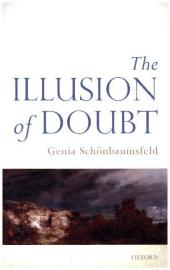 Neuerscheinungen 2016Stand: 2020-02-01 |
Schnellsuche
ISBN/Stichwort/Autor
|
Herderstraße 10
10625 Berlin
Tel.: 030 315 714 16
Fax 030 315 714 14
info@buchspektrum.de |

Genia Schönbaumsfeld
The Illusion of Doubt
2016. 192 S. 223 mm
Verlag/Jahr: OXFORD UNIVERSITY PRESS; OUP OXFORD 2016
ISBN: 0-19-878394-9 (0198783949)
Neue ISBN: 978-0-19-878394-7 (9780198783947)
Preis und Lieferzeit: Bitte klicken
The Illusion of Doubt confronts one of the most important questions in philosophy: what can we know? The radical sceptic´s answer is ´not very much´ if we cannot prove that we are not subject to (permanent) deception. This book shows that the radical sceptical problem is an illusion created by a mistaken picture of our evidential situation.
The Illusion of Doubt shows that radical scepticism is an illusion generated by a Cartesian picture of our evidential situation - the view that my epistemic grounds in both the ´good´ and the ´bad´ cases must be the same, and consists in information about an inner mental realm of experience from which I must try to work my way out to what goes on ´out there´ in the external world. It is this picture which issues both a standing invitation to radical
scepticism and ensures that there is no way of getting out of it while agreeing to the sceptic´s terms. What we therefore need to do is not try to answer the sceptical problem ´directly´, but rather to undermine the assumptions that it depends on. These are among the most ingrained in contemporary epistemology. They
include the notion that radical scepticism can be motivated by the ´closure´ principle for knowledge, that the ´Indistinguishability Argument´ renders the Cartesian conception compulsory, that the ´new evil genius thesis´ is coherent, and the demand for a ´global validation´ of our epistemic practices makes sense. Once these dogmas are undermined, the path is clear for a ´realism without empiricism´ that allows us to re-establish unmediated contact with the objects and persons in our
environment which an illusion of doubt had threatened to put forever beyond our cognitive grasp.
This book is a significant contribution to the new bloom of work in neo-Wittgensteinian anti-scepticism, and it proves very useful for interpreting some thorny passages in Wittgenstein´s corpus. Scott F. Aikin & Allysson Vasconcelos Lima Rocha, Australasian Journal of Philosophy
Genia Schönbaumsfeld studied Philosophy at Oxford, Cambridge and Vienna. She is a Professor in Philosophy at the University of Southampton, and her research interests include Wittgenstein, Kierkegaard, Epistemology and the Philosophy of Religion. She is the author of A Confusion of the Spheres: Kierkegaard and Wittgenstein on Philosophy and Religion (Oxford University Press 2007) and of many papers and articles in her research
areas.
Genia Schönbaumsfeld studied Philosophy at Oxford, Cambridge and Vienna. She is a Professor in Philosophy at the University of Southampton, and her research interests include Wittgenstein, Kierkegaard, Epistemology and the Philosophy of Religion. She is the author of A Confusion of the Spheres: Kierkegaard and Wittgenstein on Philosophy and Religion (Oxford University Press 2007) and of many papers and articles in her research areas.


